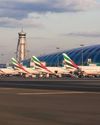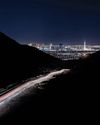An investigation of Hangzhou, China’s technological epicentre, reveals Bond-like gadgets and sci-fi aspirations

Lining the walls of a large, white, circular room are dozens of CCTV cameras, their all-seeing lenses trained on the crowd below. As people walk about, portraits start to appear on mounted TV monitors, along with personal statistics such as height and gender. I see my own face pop into view, along with an estimation of my age, which, to my dismay, is off by about ten years – and not in the flattering direction.
Being displayed on another screen is a veritable army of small orange robots zipping across a post office warehouse. The fully automated bots are using HD cameras and QR codes placed on the floor to move about and sort packages into their correct locations. “When they run out of electricity, they calculate the route they have to take to get to the charging stations and then charge themselves,” my guide explains.
In the middle of the room, sitting a top a white plinth, is a large remote-controlled drone about a metre wide. Next to it is a rifle with what can only be described as a television aerial sticking out from the barrel. According to my guide (who I’m tempted to call “Q” at this point), the aerial gun blocks a drone’s remote radio signal – using jamming equipment used in China’s space technology – thus causing it to fall from the sky.
This is the headquarters of Hikvision, a multinational technology company that has its head office in Hangzhou, the capital of eastern China’s Zhejiang province southwest of Shanghai. While its name may not be as familiar as other tech behemoths like Alibaba or Huawei, the 16-year-old Chinese company is a giant in its own right, with a market capitalisation of more than US$20 billion and a 19.5 percent market share of the global video surveillance industry. The company has more than 20,000 employees worldwide, with its products being utilised all over the world from the Brazil World Cup Stadium to Milan’s Malpensa Airport.
هذه القصة مأخوذة من طبعة January 2018 من Business Traveller Middle East.
ابدأ النسخة التجريبية المجانية من Magzter GOLD لمدة 7 أيام للوصول إلى آلاف القصص المتميزة المنسقة وأكثر من 9,000 مجلة وصحيفة.
بالفعل مشترك ? تسجيل الدخول
هذه القصة مأخوذة من طبعة January 2018 من Business Traveller Middle East.
ابدأ النسخة التجريبية المجانية من Magzter GOLD لمدة 7 أيام للوصول إلى آلاف القصص المتميزة المنسقة وأكثر من 9,000 مجلة وصحيفة.
بالفعل مشترك? تسجيل الدخول

Onwards and upwards
In an exclusive interview with Ian Fairservice for Business Traveller, His Highness Sheikh Ahmed bin Saeed Al Maktoum, President of the Dubai Civil Aviation Authority and CEO and Founder of the Emirates Group, provides insight into the current and future state of travel and Emirates’ pivotal role in getting the industry back on track

Cleaning up the crisis
How hotels have risen to the challenge of keeping guests safe during the pandemic

The Great Vegas Meetings Magic Act
The city is working hard to conjure up events and make millions of visitors reappear

TAKES OFF
Corporations are seeking new travel solutions that put safety and convenience first

TEE TIME IN TOKYO
The Tokyo Olympics may be delayed, but the golf courses around Japan’s capital aren’t slowing down

KEYS TO THE KINGDOM
New and upcoming hotels to check out when you next visit Saudi Arabia

QATAR CALLING
A swathe of hotels are opening in the Gulf State in the run-up to the 2022 FIFA World Cup

MEMPHIS CON BRIO
Music and history flood through the heart and soul of this quintessential American river town

Sofitel Mumbai BKC
BACKGROUND Sofitel Mumbai BKC is one of Accor’s most prominent addresses in Mumbai, Maharashtra. The French hospitality group’s other hotels in the city are operated under the Novotel and ibis brands.

Taking Scotland in Stride
A walk through the Highlands and Borders is the best way to touch this country’s history and nature